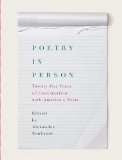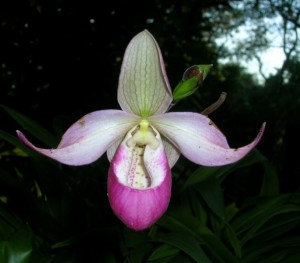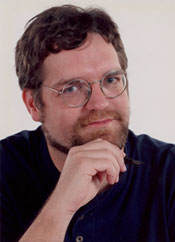Does this line from Roethke’s “Lost Son” make you want to spend some time with his work? Here’s your chance. As a teenager I was thoroughly seduced by Theodore Roethke’s work, and still love it. As Galway Kinnell put it: “I suppose what I like most in Roethke is particularly that interest he had in real things including slimy things that everybody thought were too base a subject for poetry. There aren’t any angels in Roethke’s poems, but there are slugs and worms, and I like that about him.”
 I came back to Roethke to this morning, remembering my great love of Roethke’s work by way of reading Poetry in Person, a series of interviews from a class run by Pearl London at the New School in New York, starting in 1970 and running for almost 25 years. The roster of interviewees is stellar, and the class became famous. Im jealous that I don’t have a similar resource in my life. There’s a short introduction to this book on youtube and a longer video of the celebration of its publication with anecdotes and readings by Maxine Kumin (someone else who writes about real things!), Paul Muldoon, Robert Pinsky, Ed Hirsch and others.
I came back to Roethke to this morning, remembering my great love of Roethke’s work by way of reading Poetry in Person, a series of interviews from a class run by Pearl London at the New School in New York, starting in 1970 and running for almost 25 years. The roster of interviewees is stellar, and the class became famous. Im jealous that I don’t have a similar resource in my life. There’s a short introduction to this book on youtube and a longer video of the celebration of its publication with anecdotes and readings by Maxine Kumin (someone else who writes about real things!), Paul Muldoon, Robert Pinsky, Ed Hirsch and others.
Roethke was not among those interviewed for the class, but the snippet from the Kinnell interview led me to take down my Collected Poems of Theodore Roethke and read through the opening sequence of Lost Son and Other Poems. Roethke deserves a better edition than this badly printed book! There is a Selected Poems, which despite the hideous portrait on the front seems like a book worth owning. Here are three poems by Roethke, and an elegy for Roethke by John Berryman. Roethke’s father owned a nursery and greenhouse, hence all the gardening images.
Orchids
They lean over the path,
Adder-mouthed,
Swaying close to the face,
Coming out, soft and deceptive,
Limp and damp, delicate as a young
bird’s tongue;
Their fluttery fledgling lips
Move slowly,
Drawing in the warm air.
And at night,
The faint moon falling through whitewashed
glass,
The heat going down
So their musky smell comes even stronger,
Drifting down from their mossy cradles:
So many devouring infants!
Soft luminescent fingers,
Lips neither dead nor alive,
Loose ghostly mouths
Breathing.
Wish for a Young Wife
My lizard, my lively writher,
May your limbs never wither
May the eyes in your face
Survive the green ice
Of envy’s green gaze;
May you live out your life
Without hate, without grief,
And your hair ever blaze
In the sun, in the sun,
When I am undone,
When I am no one.
Big Wind
Where were the greenhouses going,
Lunging into the lashing
Wind driving water
So far down the river
All the faucets stopped?—
So we drained the manure-machine
For the steam plant,
Pumping the stale mixture
Into the rusty boilers,
Watching the pressure gauge
Waver over to red,
As the seams hissed
And the live steam
Drove to the far
End of the rose-house,
Where the worst wind was,
Creaking the cypress window-frames,
Cracking so much thin glass
We stayed all night,
Stuffing the holes with burlap;
But she rode it out,
That old rose-house,
She hove into the teeth of it,
The core and pith of that ugly storm,
Ploughing with her stiff prow,
Bucking into the wind-waves
That broke over the whole of her,
Flailing her sides with spray,
Flinging long strings of wet across the roof-top,
Finally veering, wearing themselves out, merely
Whistling thinly under the wind-vents;
She sailed until the calm morning,
Carrying her full cargo of roses.
A Strut for Roethke
Westward, hit a low note, for a roarer lost
across the Sound but north from Bremerton,
hit a way down note.
And never cadenza again of flowers, or cost.
Him who could really do that cleared his throat
& staggered on.
The bluebells, pool-shallows, saluted his over-needs,
while the clouds growled heh-heh, & snapped, & crashed.
No stunt he’ll ever unflinch once more will fail
(O lucky fellow, eh Bones?)—drifted off upstairs,
downstairs, somewheres.
No more daily, trying to hit the head on the nail:
thirstless: without a think in his head:
back from wherever, with it said.
Hit a high long note for a lover found
needing a lower into friendlier ground
to bug among worms no more
around um jungles where ah blurt ‘What for?’
Weeds, too, he favored as most men don’t favor men.
The Garden Master’s gone.
John Berryman
“The Waking” (a villanelle), “My Pappa’s Waltz,” “In a Dark Time,” are some of Roethke’s most famous poems, easy to find online. You can hear Roethke read “Big Wind” if you like. Stanley Kunitz wrote a wonderful tribute to Roethke that gives a sense of the man and his work.




